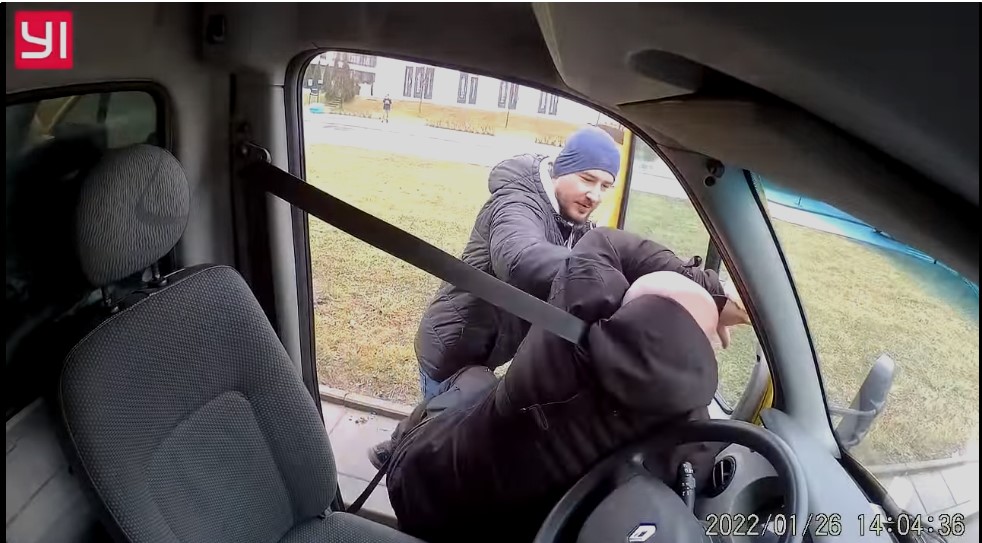The driver of a van bearing anti-abortion slogans has been attacked in Warsaw, with the incident recorded on video. The assault is the latest in a series of attacks on such vehicles, which feature graphic images of dead foetuses and are driven around Polish cities by a conservative NGO. Some have previously been set on fire.
The incident came the day after news emerged of the death of a woman whom doctors had required to carry a dead foetus in her womb for over a week. The woman’s family have blamed her death on Poland’s recently introduced near-total abortion ban.
When the van stopped at a red light in the Warsaw district of Wilanów, a man threw an object at the vehicle then opened the driver’s door and tried to jerk him outside. During a brief scuffle, the attacker hit the driver twice and tried to break his phone before running away.
The driver, identified only by his first name as Jan, said that he would pass the recordings – where the face of the assailant is clearly visible – to the police for identification. The foundation has also issued a public appeal to identify the assailant.
Jan noted that the physical attack was “not the first” on staff of Fundacja Pro, a conservative NGO which owns around ten such vans. They have been used to spread anti-LGBT messages in cities across Poland, as well as anti-abortion ones.
There have been at least five cases of such vans being set on fire. Fundacja Pro also claimed in November that another of its workers, Dawid, was “hit with heavy chains” while sitting in a similar van, reports TVP Info.
“Based on such attacks, we understand that abortionists do not respect the lives of those most vulnerable,” said the driver, Jan, quoted by Polskie Radio. “If you stand up for the unborn, they can attack you as well.”
“Despite these attacks, it is our duty to preach the truth,” said Mariusz Dzierżawski from the foundation’s board. “The bandits who support abortion are also ready to attack those who have already been born.”
The NGO has faced a series of legal cases over its anti-abortion and anti-LGBT vans and billboards, some of which courts have found to violate the law. In 2020, Kraków city council sought to ban the public display of images of aborted foetuses of the type that Fundacja Pro has become known for using.
Last year, prosecutors indicted two LGBT activists for their alleged involvement in an attack on another of Fundacja Pro’s vans, which had been broadcasting homophobic messages.
Polish state TV has broadcast further footage of the incident that led to an LGBT activist being detained for two months
A van broadcasting anti-LGBT slogans was vandalised and its driver physically attacked
The activist (wearing glasses) is seen clearly pic.twitter.com/GQE1DLhNr3
— Daniel Tilles (@danieltilles1) August 9, 2020
The latest attack on a Fundacja Pro van took place on Tuesday this week. That was one day after news emerged of the death of 37-year-old Agnieszka, a woman pregnant with twins who had been made to carry one of her foetuses for over a week after it died.
Her family blamed Poland’s abortion law – one of the strictest in Europe – which they said had prevented or discouraged doctors from removing the dead foetus until the second one also died. They say that this caused Agnieszka to suffer from sepsis, leading to a deterioration in her health and then death.
However, the hospital that treated her denies any wrongdoing, while conservative supporters of the abortion law note that it specifically allows doctors to terminate a pregnancy if it threatens the mother’s life.
An obstetrics doctor says that, though he is opposed to Poland's near-total abortion ban, it had nothing to do with Agnieszka's death.
He says doctors reacted to the death of one twin foetus in a fully justified manner consistent with global standards https://t.co/bb2rVBoaWj
— Notes from Poland 🇵🇱 (@notesfrompoland) January 28, 2022
Main image credit: Fundacja Pro TV/YouTube

Maria Wilczek is deputy editor of Notes from Poland. She is a regular writer for The Times, The Economist and Al Jazeera English, and has also featured in Foreign Policy, Politico Europe, The Spectator and Gazeta Wyborcza.



















